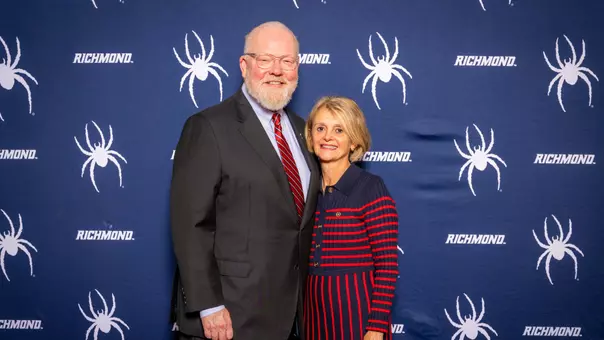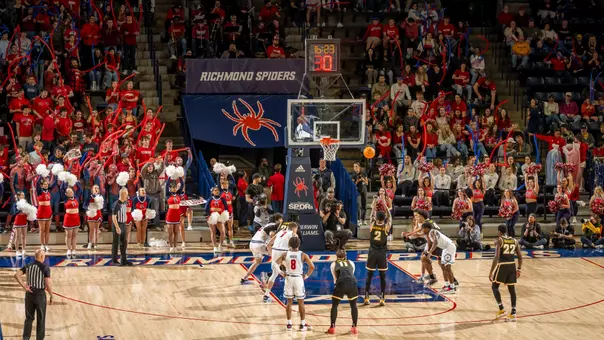University of Richmond Athletics

Spiders in Greece: Delphi
01/15/2024 | General, Academic Services, Spider Leadership, Spider Performance
Through a partnership with the Office of the Chaplaincy, Spider student-athletes are exploring religious traditions, history, and culture in both the ancient world and the present during a Global Leadership Immersion to Greece this week. Follow the Spiders on their journey with daily recaps from the student-athletes.
Good morning!
Today is the sixth blog of our Greece Immersion Program, and we are traveling 120 miles to Delphi to visit the Sanctuary of Apollo and the Delphi Archaeological Museum. Delphi is beautiful, mountainous, and picturesque. In the background, you could see the snow-topped mountains, home to many of the area's ski resorts. Courtesy of our fantastic tour guide, we learned about the mythology and pagan religion surrounding Delphi and its architecture. According to Greek mythology, Apollo, the god of light, sun, music, and dance, was infatuated with the city and wanted to claim it as his own. However, the city was already occupied by Gaia, also known as Mother Earth, and therefore, to take ownership of the sanctuary, Apollo had to battle the great python, which he did and was victorious.
The sanctuary served two main functions during the 10 century BC and 392 AD as a religious center and geopolitical site. Firstly, the sanctuary served as a temple to Apollo and those who wished to have their prophecies unveiled. Those wishing to do so had to first make a sacrifice to the gods, which would consist of sheep, lamb, etc. To determine whether the gods accepted this sacrifice and would allow one's future to be revealed, the priests would throw cold water on the animals to see if they would shiver. The animals that remained stoic were deemed insufficient sacrifices, and those who shivered were accepted. Second, the seeker of fate would have to cleanse themselves with water from the Kastilian Spring (which we visited today!) and adhere to a particular diet before entering the underground space. The purifying water of the Kastalian Spring gushed from the slopes of the Phaedriada, and flowed into a narrow gorge, where myth had it that the dread guardian of the oracle Python, the son of Earth, had its lair. The stone fountain of the same name was built along the side of the road that led to the precinct of Apollo in the early 6th Century B.C. It supplied the sacred oracle with water, which served for the purification both of priests as well as the faithful who entered the sanctuary. We all couldn't help but to take either a touch, or drink from this spring that is still running along the side of the mountain today.
The prophecy would be given through a woman called Pythia, a medium that could connect with the Gods through a routine of chewing laurel leaves and inhaling the hallucinogenic gasses (later discovered to be ethane, methane, and ethylanamium). As the Pythia would relay the prophecy, male priestesses would attempt to transcribe and publicly display them. The geopolitical function of the Oracle of Delphi evolved from its religious traditions, becoming a tool of prosperity for rulers of ancient city-states and a way to justify power. Rulers from city-states such as Athens and Sparta would inquire about the futures of their lands to aid in their decision-making processes. The answers had the potential to bring great prosperity or grave disaster, which often depended on the perceived value of the gift. For example, these answers could be used to justify the conquering of other cities if it appeared to be the will of the gods. Additionally, city-states, through gifts such as sculptures or temples, could display a connection between the gods and themselves, emphasizing the states' unquestionable importance. Overall, the relationship between religion and state in Delphi made me reflect on the relationship between the two in the United States, specifically when it comes to the aspect of interpretation. The prophecies given by the Pythia were often misinterpreted, leading to disaster and unnecessary death. Though it may not be as extreme in the United States, the use of vague language and importance of interpretation in practice is similar to that of two texts, the Bible and the Constitution. Both have significantly shaped our state's culture regarding polarized subjects. Today made me realize the importance of being open-minded and the power of text on societies.
Upon leaving the archaeological grounds, we stopped in a small town called Arachova for lunch, where we indulged in traditional Greek foods, and enjoyed the best dessert. My table finished each honey coated pastry, leaving no traces of their existence. Then, we had some free time to explore the town on our own, visiting many small local shops on our walk through its winding street. Traffic heading back into Athens was really bad. Our tour guide said it was a cold day, so everyone must have been driving their cars to work. It should have taken us about two hours to return to the city, but instead it took about three and a half. Athens, as a city, is really quite large, with a population of about four million people. We are all thankful to have the opportunity to engage with another community such as this, to meet new people, learn about a new culture, and spread this newly acquired knowledge upon our return to The United States.
Best,
Maddy Sesay
Women's Lacrosse
Good morning!
Today is the sixth blog of our Greece Immersion Program, and we are traveling 120 miles to Delphi to visit the Sanctuary of Apollo and the Delphi Archaeological Museum. Delphi is beautiful, mountainous, and picturesque. In the background, you could see the snow-topped mountains, home to many of the area's ski resorts. Courtesy of our fantastic tour guide, we learned about the mythology and pagan religion surrounding Delphi and its architecture. According to Greek mythology, Apollo, the god of light, sun, music, and dance, was infatuated with the city and wanted to claim it as his own. However, the city was already occupied by Gaia, also known as Mother Earth, and therefore, to take ownership of the sanctuary, Apollo had to battle the great python, which he did and was victorious.
The sanctuary served two main functions during the 10 century BC and 392 AD as a religious center and geopolitical site. Firstly, the sanctuary served as a temple to Apollo and those who wished to have their prophecies unveiled. Those wishing to do so had to first make a sacrifice to the gods, which would consist of sheep, lamb, etc. To determine whether the gods accepted this sacrifice and would allow one's future to be revealed, the priests would throw cold water on the animals to see if they would shiver. The animals that remained stoic were deemed insufficient sacrifices, and those who shivered were accepted. Second, the seeker of fate would have to cleanse themselves with water from the Kastilian Spring (which we visited today!) and adhere to a particular diet before entering the underground space. The purifying water of the Kastalian Spring gushed from the slopes of the Phaedriada, and flowed into a narrow gorge, where myth had it that the dread guardian of the oracle Python, the son of Earth, had its lair. The stone fountain of the same name was built along the side of the road that led to the precinct of Apollo in the early 6th Century B.C. It supplied the sacred oracle with water, which served for the purification both of priests as well as the faithful who entered the sanctuary. We all couldn't help but to take either a touch, or drink from this spring that is still running along the side of the mountain today.
The prophecy would be given through a woman called Pythia, a medium that could connect with the Gods through a routine of chewing laurel leaves and inhaling the hallucinogenic gasses (later discovered to be ethane, methane, and ethylanamium). As the Pythia would relay the prophecy, male priestesses would attempt to transcribe and publicly display them. The geopolitical function of the Oracle of Delphi evolved from its religious traditions, becoming a tool of prosperity for rulers of ancient city-states and a way to justify power. Rulers from city-states such as Athens and Sparta would inquire about the futures of their lands to aid in their decision-making processes. The answers had the potential to bring great prosperity or grave disaster, which often depended on the perceived value of the gift. For example, these answers could be used to justify the conquering of other cities if it appeared to be the will of the gods. Additionally, city-states, through gifts such as sculptures or temples, could display a connection between the gods and themselves, emphasizing the states' unquestionable importance. Overall, the relationship between religion and state in Delphi made me reflect on the relationship between the two in the United States, specifically when it comes to the aspect of interpretation. The prophecies given by the Pythia were often misinterpreted, leading to disaster and unnecessary death. Though it may not be as extreme in the United States, the use of vague language and importance of interpretation in practice is similar to that of two texts, the Bible and the Constitution. Both have significantly shaped our state's culture regarding polarized subjects. Today made me realize the importance of being open-minded and the power of text on societies.
Upon leaving the archaeological grounds, we stopped in a small town called Arachova for lunch, where we indulged in traditional Greek foods, and enjoyed the best dessert. My table finished each honey coated pastry, leaving no traces of their existence. Then, we had some free time to explore the town on our own, visiting many small local shops on our walk through its winding street. Traffic heading back into Athens was really bad. Our tour guide said it was a cold day, so everyone must have been driving their cars to work. It should have taken us about two hours to return to the city, but instead it took about three and a half. Athens, as a city, is really quite large, with a population of about four million people. We are all thankful to have the opportunity to engage with another community such as this, to meet new people, learn about a new culture, and spread this newly acquired knowledge upon our return to The United States.
Best,
Maddy Sesay
Women's Lacrosse
Men's Basketball Highlights vs. Southern Illinois
Sunday, December 14
Men's Basketball Postgame - Southern Illinois
Sunday, December 14
WBB Postgame: Liberty (Maggie Doogan)
Saturday, December 13
Men's Basketball Press Conference - December 12
Friday, December 12




